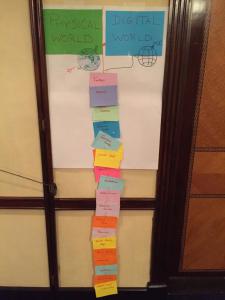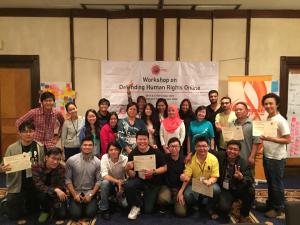
 APC IMPACT – IRHR
APC IMPACT – IRHR
Human rights defenders, including advocates working on gender and sexual rights, bloggers, journalists, and pro-democracy activists, are increasingly experiencing technology-related human rights violations. These violations include censorship, such as criminalisation of online expression, and blocking, control and manipulation of internet content; interference with the right to privacy, including unlawful surveillance; as well as restrictions/limitations on internet access, which impact a range of human rights.
In India, Malaysia and Pakistan, such threats are commonplace, yet not enough human rights defenders and civil society organisations have the capacity to identify and respond to technology-related human rights violations. As a response, the APC-IMPACT project is using the Internet Rights Are Human Rights (IRHR) curriculum with the goal of providing human rights defenders with knowledge, tools, networks and support to respond to these violations, and to communicate more safely online.
Following an Internet Rights Training eXchange which took place in Jakarta in late May of this year, Bytes for All (B4A), Pakistan, Digital Empowerment Foundation (DEF), India and EMPOWER, Malaysia each developed training programmes for target groups in their respective countries.
Each organisation has developed local case studies that highlight the types of technology-related human rights violations that occur, the stakeholders involved, and the complexity of formal and informal responses to these violations.
In India, DEF has incorporated the Internet Rights Are Human Rights curriculum into trainings with grassroots NGOs and DEF Centres, and is conducting lectures and workshops with academic institutions. In September, DEF’s Rajat Kumar presented the Feminist Principles of the Internet at Avadh Girls’ Degree College in Lucknow, India. Most participants had regular access to the internet through the college, but did not have a sense of how the internet operates. This lecture was the first time that participants had heard feminism being applied in the context of the internet and its governance. Many of the students expressed interest in engaging with the concepts of the lecture further, and DEF is exploring options to follow up.
 What does the internet mean to you?
What does the internet mean to you?
In the next phase of the project, DEF will work with human rights defenders to raise awareness about the impact of the internet on their work, increase the levels of accountability mechanisms for internet-related rights violations, and advance agendas that improve conditions for the respect and application of human rights online.
In Malaysia, EMPOWER held IRHR training workshops in October over a period of two weekends. The first two days focused on “Setting the Agenda on Internet Rights”, with sessions on internet infrastructure and internet-related laws in Malaysia, international human rights frameworks, and the Feminist Principles of the Internet. Using the hashtag #IRHR2015, the participants, trainers and EMPOWER staff shared photos and comments, pondering questions such as, “Is the internet more important than food, water or electricity, if subsidised?”
In the second weekend training on 17-18 October, EMPOWER focused on “Advocating and Securing Internet Rights”. Digital security trainers from Bytes for All, Pakistan facilitated sessions with hands-on training to use password managers, private web browsing, and encrypted messaging, to build the capacity of participants to use the internet safely and securely.
In Pakistan, Bytes for All has conducted several digital security trainings as part of the APC-IMPACT project, and has hosted lectures on topics relating to internet rights. The first IRHR training workshop was held by B4A on 17-18 October in Rawalpindi, Pakistan. The workshop focused on international rights regimes and local legislation relating to restrictions on freedom of expression, access to information, privacy, and online surveillance. The case studies generated discussion about cultural and religious values, and the limitation of freedom of expression, both online and offline.
 Participants at EMPOWER training
Participants at EMPOWER training
Going forward, APC-IMPACT partners will update and revise the IRHR curriculum materials and methodologies, working with APC to develop new modules and exercises to help human rights defenders and civil society identify and respond to internet rights violations and protect themselves online.
Links and resources
- EMPOWER IRHR workshop photos
- Bytes for All IRHR training
- DEF presentation on Feminist Principles of the Internet
- Internet Rights Are Human Rights curriculum modules
- Internet Rights Are Human Rights curriculum translated into Hindi
- Internet Rights Are Human Rights Curriculum translated into Urdu
Internet Rights Training eXchange – Jakarta Storify